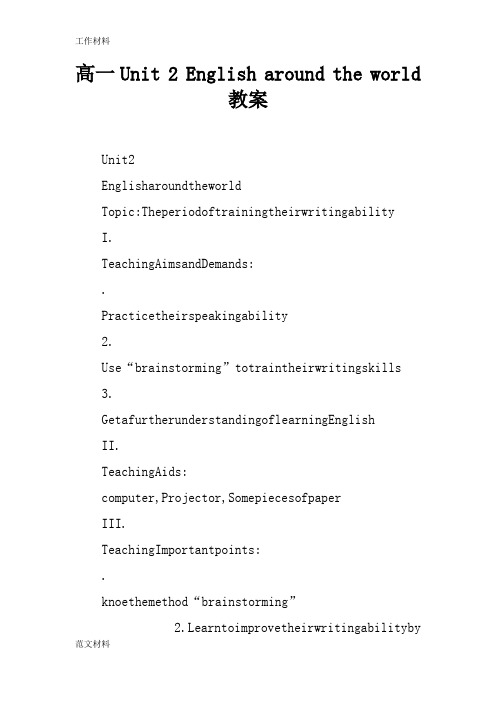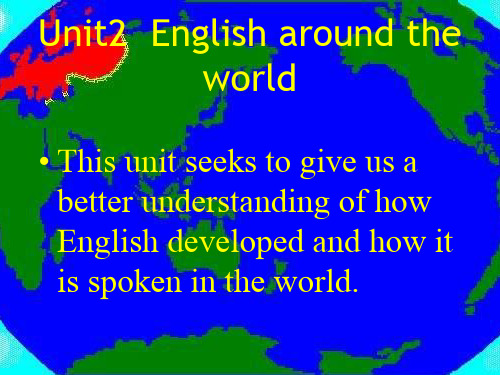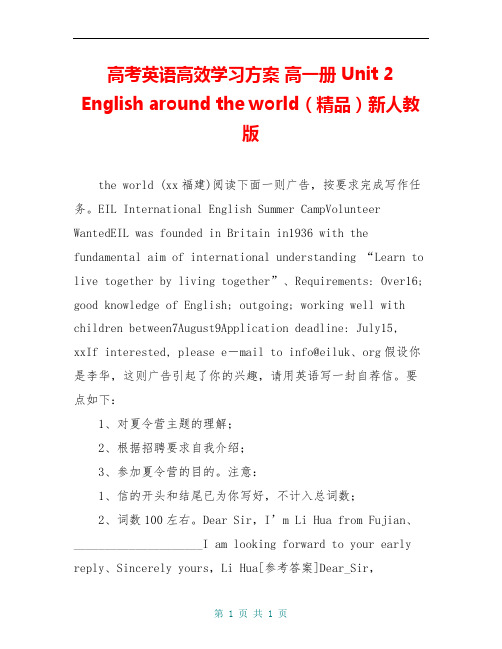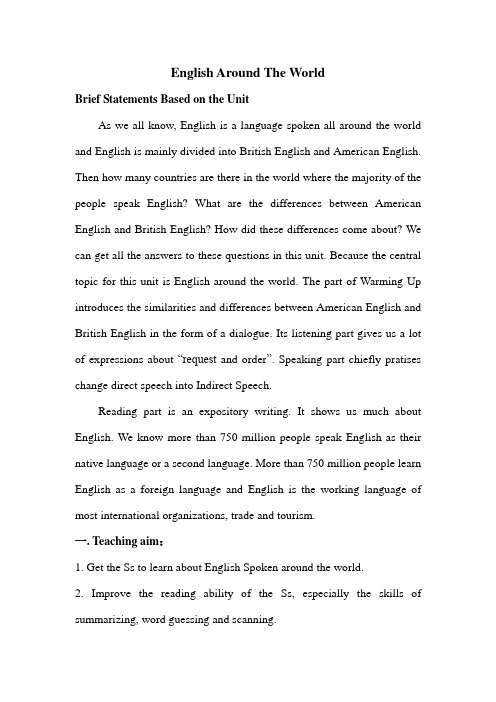高一英语:Unit2《English_around_the_world》Learning_about_Language_&_Using_Language(新人教版必修1)
【知识学习】高一Unit 2 English around the world教案

高一Unit 2 English around the world教案Unit2EnglisharoundtheworldTopic:TheperiodoftrainingtheirwritingabilityI.TeachingAimsandDemands:.Practicetheirspeakingability2.Use“brainstorming”totraintheirwritingskills3.GetafurtherunderstandingoflearningEnglishII.TeachingAids:computer,Projector,SomepiecesofpaperIII.TeachingImportantpoints:.knoethemethod“brainstorming”2.Learntoimprovetheirwritingabilityby“brainstorming”3.writeapassageinashorttimeIV.TeachingDifficultpoints:.Howtouse“brainstorming”toprepareforapassage2.Howtohelpstudentssumupandmastertheknowledgeaboutthi sunit.V.Teachingmethods:.Questioning–and—answering2.group–work3.brainstorming4.FreetalkVI.culturalawareness;.knowtheimportanceoflearningEnglish2.knowthereasonsoflearningEnglishVI.Emotion:.Learntouse“brainstorming”toprepareforapassgeandsolvethewritingproblemsbythen selves.2.Trytoappreciateandlearnsomethinggoodfromothersincla ss.VII.Teachingprocesure:Step1:greetingsandrevisionStep2:theintroductionof“brainstorming”.Atthebeginningofthisclass,tellthemafunnystoryabout “peanut”oneday,fourboyswereinthezoo,andapolicewastalkingtot hem.Theboysdidsomethingwrongjustnow,sothepolicewasaskingthem.“whatdidyoudojustnow?Tom.”“Ididn’tdoanythingbutthrowpeanutintotheelephant.”Sothepoliceansweredthesecondboy,butheansweredthesam easTom.Thenthepoliceaskedthethirdboy “whatdidyoudojustnow?Didyoudosomethingwrong?”Buttheboystillsaidnothingbutthrowpeanutintotheeleph ant.Atlastthepolicehadtoasktheyoungestboywhathedida momentbefore.Theboycriedloudly,“mynameispeanut!”2.Afterthisfunnystory,askthemsomequestionsaboutthispa ssage.canyouunderstandwhatIsaidjustnow?canyouretellthestory?Thestorycamefromanewspaper,canyoureadthepassagewith outdifficultiesifIgiveyouthepaper?canyouwritedownth ispassage?3.AskthemaboutthesefourbasicskillsofEnglish,“whichisthemostdifficult?”T:Howcanwesolveit?canwefindamethodtomakewritingeasier?Today,Iamgoingtoteachyouamethod,maybeiswillhelpy oumoreorless.wecallit“brainstorming”.whatis “brainstorming”?4.Drawapictureandexplainthemeaningof “brainstorming”forthem.T:whenwedobrainstormingweshouldpayattentiontothesef oursteps,Thinkoftheanswersasmanyaspossiblebyyourself.Shareyourideaswithothers.Decidewhicharethebestideas.Putthoseideasintoamapsothatyoucaneasilyseethem.5.Dosomesimpleexamplestopracticethismethod,writedow naword“animal”ontheblackboard,andaskthemtotalkfreelyaccordingtoit .Afterthatletthemdomorespeakingexercisesuchastalkin gfreelyabout“color”or“culturerelics”.6.Pair-workDoamoredifficultbrainstormingexerciseinclass.Giveth emtheword“English”,askthemtosaysomethingabouttheword.Discu ssitwiththeirpartnersandgettheanswersasmanyaspossib le.7.Askthemtoshowtheiranswersonebyone.Step3Brainstormingaroundthetopic “whyshouldwelearnEnglish?”.Group-workBrainstorming “whyshouldIlearnEnglish?”Discussitinsidetheirgroupfreely.writedownasmanysentencesastheycanandtrytomakeabrain stormingmap.Givethemsomeusefulwordstohelpthemifnecessary.Suchas “university,college,business,worldtrade,newspaper, magazien,program,movies,moderntechnology,developmen t…”2.Asksomeofthemtoreadouttheiranswers.Afterthatshowthemanexampleontheprojector.……3.Teachthemhowtousethismaptohelpprepareforthepassage.Step4while-writing.writeapassageinclass:“AboutEnglish”.2.Group-workGivethemthemainideaofeachparagraph.Dividethewholecl assintofourbiggroups,eachgroupshouldtrytheirbesttof inishaparagraphinclasswiththehelpofbrainstorming.Paragraph1ThepresentsituationofEnglish.Paragraph2Englishisimportantanduseful.Paragraph3myprobleminlearningEnglish.Paragraph4HowwillIimprovemyEnglishinthefuture.3.Givethem12minutestofinishtheparagraphbythemselvesin class.whentheyfinishwriting,thewholegroupcanappreciatethe articletheywrotefirst,thenfindoutsomemistakesifposs ible.Step5Post-writing.chooseseveralgroupstoshowtheirarticlestotheclassont hescreen.2.Askthemiftheycanunderstandtheparagraphwrittenbyothe rstudents.Andtrytofindoutsomemistakesorgivesomeadvi ceaboutparagraph.3.Askthemtomarksomegoodsentencesfromotherstudents’paragraph.4.Askthemtogiveamarktothispassage.Step6SummaryandHomework.Summarizewhatwehavelearnedtoday.2.makeanexerciseof“brainstorming”bythemselves.3.writeapassageon“myexperienceoflearning…”Step7Recordafterteaching.Thefunnystorygottheirgreatinterestatthebeginningoft heclass.2.mostofthemcanunderstandthemeaningof “brainstorming”.3.manyofthemcanlearntouse“brainstorming”tohelppreparefortheirpassage.4. Timeifnotenoughformetoaskmorestudentstoshowtheirpassages.5.Forsomestudents,theworkbookexercise “myexperienceoflearningEnglish”istoodifficult,soIchangethetopicofthearticle,butiti salittledifficultforsomeofthestudentstofinish.6.It’snotnecessarytogivethemsomanyhelpfulwordstomakesent ences,itmaylimittheirimagination,butIcangivethemsom eunlessthestudentsaskmetodo.VIII.教学反思利用一则有趣的英语故事作为本堂课的导入,一开始就充分激发了学生学习的兴趣和热情,为本课的教学开了个好头。
高中英语第一册上unit 2 English around the world. About English ppt

Jamaica
Student 4:
Ireland
• I live on a huge green island in western Europe. Hundreds of years ago my people spoke a very different language from English. Then the British rulers came. Now the language is spoken in only a few villages in the western part of my country. Most of us speak a lovely kind of English that also sounds a little like our music.
Questions
• Which language do you think is the most widely used language in the world? • Do you think Chinese can be a world language ? Why? • Do you know the meaning of “Englishes”?
Unit2 English around the world
• This unit seeks to give us a better understanding of how English developed and how it is spoken in the world.
A
Joke
• Two mice sat in their hole watching Cat lurk outside. "I know how to make Cat go away," said the first mouse. "How?" the second mouse asked in surprise. "Watch! Bow, wow!!!" barked the first mouse. Peering through their hole in the wall, they saw Cat running away in fear. "Ah, see the benefit of knowing another language!"
人教新课标高一英语必修1第二单元(Book 1) Unit 2 English around the world学案含答案

Unit2 English around the world(Module 1)Period 1 Reading: The Road to Modern English班级__________ 姓名____________ 学号_____________ Learning Objectives:1.Learn the useful new words and expressions.2.Read the passage and learn about the development of English.3.Learn the reading sub-skills-- scanning and skimmingLearning Key Points:Learn reading skills: scanning and skimmingLearning Difficult Points:Improve the reading ability.Learning Procedures:I.【Pre-class homework】自主探究A:Tell the sentences True or False1.English had the most speakers in the 17th century.2.English developed when new settlers and rulers came to Britain.nguages frequently change.4. The language of the government is always the language of the country.5. English is one of the official languages used in India.6. This reading describes the development of the English language.B:fill in the form according to text.AD450--1150 English was based on ____1_______At the end of the 16th century How many people speak English?_______2___Shakespeare made use of a wider vocabulary.______3____Some British settlers moved to America._______4____English began to be spoken in _______5___ Later in the 18th centuryThe language was settled._____________6___II.【While-class】Step 1 Lead-inStep 2 Group discussion 合作讨论展示点评Ss discuss their pre-class homework in group.Step 3 Practice:练习拓展A:Choose the correct answer1.English has/had the most speakers___.A.NowB. when the British ruled many parts of the worldC. in the time of ShakespeareD. in the 12th century2.Which of the following statement is true?A. Languages always stay the sameB. Languages change only after warsC. Languages no longer changeD. Languages change when cultures change3. Why was Shakespeare able to make use of a wider vocabulary by the 1600s?A. Because new settlers enriched English and especially its vocabulary.B.Because Shakespeare made up many new words.C. British settlers moved to different countries.D.A new dictionary was written.4.What happened to American English in the 19th century?A.It became more like British EnglishB. It became more like German.C.It had its own dictionary.D.Its spelling was given a separate identity.5.Which of the following is NOT true?A.English is one of the official language in India.B.English developed when new settlers and rulers came to Britain.C.China has the largest number of English speakers.D.Now more people speak English as their first , second or a foreign language.B. Fill in the blank with proper wordsEnglish has changed and developed 1.________cultures meet and communicate with each other.2.________AD 450 to 1150 , new settlers to English 3._______(rich) the English language and enlarged its vocabulary. In 1620, British people began to move to other countries, and 4.______________ (gradual ), English was spoken in many other countries. By the 19th century American English spelling got a separate 5._______________when Noah Webster wrote his dictionary. At 6___________, more people speak English as their first , 7_________ or a foreign language than ever before. People in South Asia 8__________ as India, Singapore speak 9______________ English.China may have the 10________________ number of English learners.Step4 PresentationStep5 SummaryIII.【Post-class】巩固提升Ⅳ.总结提升Self- reflectionI enjoyed learning about:I found these words useful:I found these expressions useful:I have learned about:Some examples:Suggested answers:Ⅰ.课前预习A: FTFFTTB: 1.German 2. 5-7million 3.By the 1600’s 4. In 16205. Australia6. By the 19th centuryII.课堂检测:A:1. A 2. D 3. A 4. D 5. CB:1.when 2. From 3. enriched 4. gradually 5. identity6. present7. second8. such9. fluent 10. largestPeriod 2 Language focus in Reading班级__________ 姓名____________ 学号_____________Learning Objectives:1. Learn and grasp the important useful new words and expressions.2. Learn the important useful sentences and patterns.3. Make sentences after the useful expressions.Learning Key points:Enable Ss to grasp the usages of such important new words and expressions.Learning Difficult Points:Get Ss to understand some difficult and long sentences.Learning Procedures:I.【Pre-class homework】(自主探究) :Make sentences using the following wordsand phrases:1.actually2.base3. because of4. come up5. at present6. make use of7.such asII.【While-class】Step 1 Lead-inStep 2 Group discussion 合作讨论展示点评Ss discuss their pre-class homework in group.Step 3练习拓展1.Today, more people speak English as their first, second or a foreign languagethan ever before.汉译英:________________________________________________________仿写:中国比以往任何时候都更加富有强大。
高考英语高效学习方案 高一册 Unit 2 English around the world(精品)新人教版

高考英语高效学习方案高一册 Unit 2 English around the world(精品)新人教版the world (xx福建)阅读下面一则广告,按要求完成写作任务。
EIL International English Summer CampVolunteer WantedEIL was founded in Britain in1936 with the fundamental aim of international understanding “Learn to live togethe r by living together”、Requirements: Over16; good knowledge of English; outgoing; working well with children between7August9Application deadline: July15,xxIf interested, please e-mail to info@eiluk、org假设你是李华,这则广告引起了你的兴趣,请用英语写一封自荐信。
要点如下:1、对夏令营主题的理解;2、根据招聘要求自我介绍;3、参加夏令营的目的。
注意:1、信的开头和结尾已为你写好,不计入总词数;2、词数100左右。
Dear Sir,I’m Li Hua from Fujian、_____________________I am looking forward to your early reply、Sincerely yours,Li Hua[参考答案]Dear_Sir,I’m_Li_Hua_from_Fujian、 When I was reading the advertisement, the aim of this activity impressed me greatly、 I think it instructive to learn to live together by living together、 It is a good opportunityfor the only child like me to learn to share and work together、 Therefore I recommend myself to you without hesitation、As a boy of17, I am outgoing, good at English and have experience of working well with children aged from7 to12、 I think it is a kind of win-win activity、 For one thing, I can help take care of the children、 For another thing, I can improve my English, make more friends, and enrich my life during the summer vacation、I_am_looking_forward_to_your_early_reply、Sincerely_yours,Li_HuaⅠ、重点单词1、______(vt、)替换2、______(vt、)比较3、______(n、)总统;校长;行长;会长4、______(vt、)发表;出版;公布5、______(n、)台;看台;摊,摊位6、______(n、)运动;动作;运转7、______(n、)信号8、______(n、)服务;服务性工作9、______(vt、 & n、)交换;交流;兑换10、______(n、)贸易;商业11、______(adj、)国际的;世界的12、______(n、)情形;境遇;(建筑物等的) 位置13、______(n、)总数;合计 (adj、)总的;全部的;整个的14、______(adj、)本国的;本地的 (n、)本地人;本国人15、______(n、)宽的[答案]1、replace2ZZZpare3、president4、publish5、stand6、movement7、signal8、service9、exchange10、trade11、international12、situation13、total14、native15、broadⅡ、词汇拓展1、independent→______(n、)独立,自主→______(n、反义词)依赖,依靠→______(adj、)依靠的,依赖的2ZZZmunicate→______(n、)通信;联系3、global→______(同义词)→______(n、)球体,地球仪4、equal→______(adv、)同样地,平等地→______(n、)平等5、majority→______(反义词)少数6、repeat→______(n、)重复7、pronounce→______(n、)发音;发音方法[答案]1、independence; dependence; dependent2ZZZmunication3、worldwide; globe4、equally; equality5、minority6、repetition7、pronunciationⅢ、重点短语1、______ the same 保持一样2、have (no)difficulty in ______ sth、做某事(没有)有困难3、more ______ less 或多或少4、be different ______ 与……不同5ZZZmunicate ______ 与……交流6、______ than 超过,不仅仅7、a great ______ 许许多多的;极多的8、bring ______ 引进;引来9、end ______ 以……告终10ZZZe ______ 发生11、stay ______ 不睡;熬夜12、except ______ 除了……之外13、______ total 总共14、______ oneself at home 别客气[答案]1、stay2、doing3、or4、from5、with6、more7、many8、in9、up10、about11、up12、for13、in14、makeⅣ、重点句型1、What do you mean by、、、?你……是什么意思?2、more than的有关句型Ⅴ、重点语法Direct and Indirect SpeechHow many monkeys are there in thezoo?laidIs Mr、White out of danger?Tom isn’t so strong as he ______, is he?—Yes、 He is ______ his two brothers、A、 thinks; no stronger thanB、 expects; as strong asC、 appears; stronger thanD、 looks; the strongest解析:考查比较状语从句。
高一Unit2-English Around The World

English Around The WorldBrief Statements Based on the UnitAs we all know, English is a language spoken all around the world and English is mainly divided into British English and American English. Then how many countries are there in the world where the majority of the people speak English? What are the differences between American English and British English? How did these differences come about? We can get all the answers to these questions in this unit. Because the central topic for this unit is English around the world. The part of Warming Up introduces the similarities and differences between American English and British English in the form of a dialogue. Its listening part gives us a lot of expressions about “request and order”. Speaking part chiefly pratises change direct speech into Indirect Speech.Reading part is an expository writing. It shows us much about English. We know more than 750 million people speak English as their native language or a second language. More than 750 million people learn English as a foreign language and English is the working language of most international organizations, trade and tourism.一. Teaching aim:1. Get the Ss to learn about English Spoken around the world.2. Improve the reading ability of the Ss, especially the skills of summarizing, word guessing and scanning.3. Encourage the Ss to think and talk in English through communicative tasks and provide the Ss with chances of cooperation.4. Get the Ss to realize the important a of Learning English and of love of our own country.二. Teaching important points:1. How to improve the Ss’ ability to read an article.2. How to get the Ss to master the useful expressions.三. Teaching Methods:1. Fast-reading to train the Ss’ reading speed.2. Reading comprehension to help the Ss grasp the main idea of the text.3. Practice getting the Ss to master what they’ve learned.四. Teaching Aids:1. a recorder2. a multimedia computer五. Teaching steps.Step 1 Greetings and RevisionGreet the whole class as usual.The teacher checks the stud ents’homework and gives explanations if necessary.Step 2 lead inTask Ss some questions,1. What language has the largest number of speakers?2. What language is the most widely spoke and used?3. In what situation do you use English in your daily life?Step 3 Fast reading.1. T present the test with brief words.The reading is about the historical development of English over the past 20 years. Developing from a widely spoken national language to a universally spoken world language.2. Ss listen to the text with 3q-uestions.(1)How many countries are there where the majority of the people speakEnglish?(2)How is English used in Hong Kong?(3)What language should we use on internet so that we can communicatewith people around the world?The students read the text and discuss the questions. The teacher goes among the students and joins the students in the discussion. Then the teacher collects the first five pieces of answers, examines them and gives them back to the students. While doing this, point out any mistakes the students make and let them correct the mistakes by themselves.Step 4 Reading1.Carefully reading, discuss the questions on screen and summarize themain idea of each paragraph.(1)How many people use English as your mother tongue?(2)How many people learn English as a second language?(3)In which countries do we find most native speakers of English? Givethe names of five countries.(4)How is English used in countries such as India, Pakistan, Nigeria andPhilippines?(5)How many people learn English as a foreign language?(6)Why is it becoming more and more important to have a goodknowledge of English?(7)Living in China you can use English every day in different situations.Give two examples.Part1. English is spoken as a native language or a second language in some countries.Part2. English is learned as a foreign language in some countries.Part3. The importance of learning English nowadaysnguage points:a.all round the world:all over the world.b.the majority of:the greater number or amount, most.c.in total:when all have been added up.d.equal:the same.e.tourism:business of providing services for the tourists.f.one’s mother tongue:one’s native languageg.the number of:number:figuresmunicate with:communicate, to make (news, opinions, feelings)known.Step 5 Listening and Read AloudThe teacher plays the tape for the students to listen and repeat. While the students read, the teacher goes among the students to correct the students’ mistakes in pronunciation, intonation and stress.Step 5 post reading.Ss are given several minutes to go over the text to make sure they fully understand the text. Then come to the EX1. These are open ending questions. Ss are encouraged to give various solutions.After the spokes man in each group gives possible answers show the suggested answers on the power point.Step 6 Discussion.English, Chinese, French and Japanese over the next 50 years, which language will become more important and why?Form groups of four discuss the questions with partners.Step 7 Summary and Homework.(1)T:We are learned an article about English. After class, you shouldread the text again to get the idea of the text further and try to master the useful expressions appearing in the text. Through learning this passage, we have got to know that English is becoming more and more popular all over the world now. So English learning seems important to everyone, especially us students of the new century. WithChina’s entry into WTO, English will play a more important part in business, in tourism, and even in people’s daily life. So it’s no doubt that everyone should have a good knowledge of English. And I hope every one in our class can make an effort to learn English well. But on the other hand, it doesn’t mean English is better than Chinese just as some students said just now. We must keep it in mind that one’s mother tongue is the most beautiful language in the world. The reason why we learn English is that we should thus be more capable of building up our country. (It’s a good chance to lead the students to love our own country as well as to learn English well.)(2)Finish exercise 2 on page 11.。
unit2_English_around_the_world教案

unit2_English_around_the_world教案Unit 2 English around the worldPeriod 1Warming Up& Pre-readingTeaching aims: To make Ss to get to know some differences between British English and American English.Important and difficult points: To tell and grasp the differences between British English and American English.Teaching procedures:TO arouse the students’ interest and lead in the topic, the teacher can organize some activities. Step1: T:We have learned something about friendship in unit 1. Do you know what problems they will meet if a British boy wants to make friend with an American boy?Step2. Let Ss discuss how many countries use English as their official language and which countries.(教师可通过PPT的形式,借助以英语为官⽅语⾔的国家国旗和世界地图来辅助完成) And do you know that there is more than one kind of English? Ss may list America, Britain, Canada, Australia……Teacher writes “American English, British English, Canadian English, and Australian English……T: Are the Englishes talked around the world all the same? (先让学⽣⾃由讨论,然后⽼师播放⼀段来⾃不同国家的母语为英语的外国⼈的视频)Step3. Get the Ss to discuss in groups about the differences between American English and British English, and give some examples.a. Can you understand the different kinds of English these people are using?Speaker1: Let’s go to the pictures?Speaker2: Ok. But how shall we go to the movies?Speaker1: Why not go by underground?Speaker2: Er, but the subway station is far away.When you hear two native speakers of English, they may still not speak the same kind of English. Situation discussionJack is a British boy. He went to America for a trip in this summer vacation. The first day he went to a restaurant and looked around for a toilet. When he asked the waitress, she told him it is on the second floor. Jack went up two floors only to find empty rooms.Where is the toilet?BSpeaker1: Can you tell me how to spell the word “neighbor”?Speaker2: N-E-I-G-H-B-O-U-R, neighbour.Summary: Main differencesSpelling, pronunciation and vocabularyPeriod 2Reading and ComprehendingTeaching aims:1、To get students to have a general view about the historical development of English.2、To get students to know different kinds of English around the world, especially the differences between British English and American English.3、To i mprove the students’ reading ability.Important points:1、How to improve the students’ reading ability.2、How to make students enlarge their knowledge on English through reading.Difficult points:1、To be able to get the main idea from the text.2、To be able to use the different reading strategies for different purposes.3、Expressing one’s ideas why one should learn English.Teaching procedures:Step1: Lead-in1. Why should we learn English?Step2SkimmingRead quickly to get the main idea of the text.1. The text mainly tells us ___________.A. that old English is different from the English todayB. how Middle English formedC. English and its historyD. that English will keep changing2. The text is developed mainly by ____.A. placeB. timeC. peopleStep3Scanning【答案】 1.England 2.based 3.German 4.vocabulary5.change /doc/5eed1d4e915f804d2b16c193.html cation9.learners10.identityStep4DiscussionWork in groups. Discuss the following question and then ask two groups to report their answers to the class. 1. Why do you think more people in the world now want to learn Chinese?Period 3 Language pointsTeaching aims: To make Ss to know the meanings of the important words and phrases and master their usages. Important and difficult points:To master the important words and phrases.Teaching procedures:1、the road to modern English常与to连⽤的名词:key, answer, entrance, monument……e. g: the key to the bike, the entrance exam to collegeThere stands a Monument to the People’s Heroes on the hill.2、Do you know that there is more than one kind of English?(P9)你知道英语不⽌⼀种吗?more than的⽤法(1)more than ⽤在数字前,意为“⽐…..多;超过……” 意为“不⽌⼀个”(含义为复数,但谓语动词⽤单数)。
高中英语第一册上unit 2 English around the world. About Eng
Student 6: Singapore
• My country is very small. In fact, it’s really a city. It is in southeast Asia and is very rich. People come from all over Asia to do business here. But our English comes from workers on the street. Some people in my country don’t kike the sound of this English. They would rather speak British English. Today, you can hear our kind of English spoken everywhere in the city and on many ships that come here.
• British English
flat pub toilet
tin lift mum rubber
American English
apartment bar bathroom
can elevator mom eraser
Chinese
公寓 酒吧
厕所,洗手间
罐头 电梯 妈妈 橡皮
Student1: India
Questions
• Which language do you think is the most widely used language in the world?
• Do you think Chinese can be a world language ? Why?
english_around_the_world教案
Unit2 English around the WorldThe First Period(第一课时)【Teaching aims】(教学目标)1.Aims of knowledge and abilities(知识与能力目标)Students will be able to①grasp some words and expressions such as, play a role in /because of/ come up/ play a part in and learn the grammar- the indirect speech of the imperative clause②know more about English language and its development and different kinds of English through this passage.③improve their reading ability④practice scanning for specific information by answering several questions at the beginning of the passage.⑤practice their oral English through group discussion and group task.2.Aims of process and methods(过程与方法目标)①Task-based teaching method and communicative teaching method.②Heuristic teaching approach, discussion approach.3.Aims of emotion and evaluation(情感评估目标)S tudents will be able to①experience different kinds of activities in the English class and develop their interest towards English.②know more about the English culture, realize the importance of English.【Teaching important points】(教学重点)1. Students will be able to learn the importance of English around the world.2. Students will be able to practice some reading skills, such as scanning, generalization, reference.3. Students will be able to improve their ability of independent study and grasp some reading skills, like skimming and scanning.【Teaching difficult points】(教学难点)1. How to train students’reading skills effectively and guide students to use these skills correctly.2. How to arouse students’interest and enthusiasm in class and help them develop their ability of independent study.【Teaching tools】(教学用具)Multimedia; PowerPoint; chalks; blackboard【Teaching procedures】(教学过程)Step1: Lead in(1)Guess picturesT:present some national flags of English speaking countries on the ppt.S: name the English-speaking countries according to the national flags.(2)Pair workAsk the students to listen to a piece of BBC news and a piece of VOA news and two in a group find the differences between British English and American English (vocabulary, spelling, pronunciation, usage, etc.) and show some examples to them. Step2: Pre-ReadingAsk students to discuss the following 2 questions:1. What are the three ways a language is often used?*Mother tongue/native language*Second language/Official language*Foreign language2. How to decide the importance of a language?*The number of native speakers*How widely the native speakers are spread*The cultural, economic and political influence of those who speak and write in it. Step3: While-reading1. SkimmingAsk the students to read quickly to get the main idea of the text.2. ScanningGuide the students to find out key sentences of each paragraph or ask them to3. Detailed reading(1)①Ask students to read the Para.1 very carefully and fill in the form③Check the answer(2) Ask students to read the Para.2 very carefully and judge according to Para.2 whether the following statements as T or F.✧The number of people who learn English as a foreign language is more man 750million.✧All people learn English for five or six years at high school.✧In China students learn English at school as a foreign language,but not HongKong.✧People in Hong Kong speak English only as a second language.(3) Ask students to read the Para.2 very carefully and answer the following questions.What language should we use on the Internet so that we can communicate with people around the world?How can we use English every day in China?Why English is so important around the world?Step4. Post-readingGroup DiscussionDiscuss two open questions:Q1:Why do you want to learn English?A1:for work, as a hobby, to learn about other people, to travel, to read literature in the original, to read research papers, to meet foreigners, to surf the Internet, to pass exams, etc.Q2: What do you think are the reasons for the spread of English around the world?A1: ★English is one of the official languages of the Olympic Games and the United Nations.★English dominates international websites and provides nearly all of the new computer terminology.★Tourism and trade from Western Europe and North America has contributed to the spread of English.★Satellite TV, radio programs like Joy FM, CDs and, of course, Hollywood films all broadcast English into China. Also, a number of Chinese films include EnglishStep5. Homework1. Search for some information about the wide use of English in China on the internet.2. Write a short essay about the discussion.【Blackboard design】(板书设计)Unit 2 English around the World On the leftImportant Words and Expressions1.Majority n.大多数the majority of2.native speakers 本地人3.mother tongue(MT) 母语4.foreign language(FL) 外语5.international organization 国际组织6.international trade 国际贸易7.Tourism 旅游业8.global culture 全球文化9.popular music 流行音乐10.have a good knowledge of 更好的了解到On the right。
人教高中英语 必修一unit2教案
人教高中英语必修一unit2教案Module 1 Unit 2 English around the world●单元规划本单元主要围绕English around the world这一主题介绍了英语的使用情况、发展情况及各地不同的方言。
第二单元English around the world的设计可分为五部分。
第一部分learn something about words and expressions;第二部分warming up and reading;第三部分the structure which expresses commands and requests;第四部分using language;第五部分writing and speaking;●课时安排本单元教学可分为6个课时。
第一课时vocabulary;第二课时为reading;第三课时为language points;第四课时为grammar;第五课时为using language;第六课时为writing and speaking;第七课时为revisionThe First Period Words and expressionsTeaching aims :1. Know the key words and expressions in the whole unit:elevator, petrol, official, voyage, actually, base, identity, command, request, recognize, straight, because of, come up, at present, such as, play a part (in)……2. Enable the students to get familiar with the pronunciation of the important words.3. Prepare for the learning process of the whole unit.Teaching important points :1.Get familiar with the words in the text part.2.Master the important expressions such as:bec ause of, come up, at present, such as, play a part (in)……Teaching methods: Task-based teaching and learning; cooperative-learning; group discussionTeaching procedures :Step 1、Self-directed learning学习方法指导:第一步:写出所给单词的音标;第二步:大声朗读三遍,注意画线字母的发音;第三步:依次写出画线字母的音标。
人教版高中英语必修一unit2_English_around_the_world_全单元课件
eraser gas apartment elevator honour colour movies subway
Nowlet’scometoreadin g
TheroadtomodernEnglish
Predict(预测):
Readthetitle“Theroadtomoder nEnglish”andpredict(预 测)whatthepassageismainlyabo ut?
Readthetextagain,doth eEx.1inPage10 Ifit’sfalse,correctit.
Afterthe17thcentury,morepeoplebeganto SpeakEnglish.
1.Englishhadthemostspeakers inthe17thcentury.
11.__________andChina. India Singapore SouthAfrica
Malaysia
1.becauseof+名词/代词 因为,由于 because+句子
Hepassedtheexam____b_e_c_a_u_s_e_o_f _hishardwork. Iwentbacknot_____b_e_c_a_u_s_e_otfherain,but __b_e_c_a_u_s_e__Iwastired.
WhenyouheartwonativespeakersofE nglish,theymaystillnotspeakthesa mekindofEnglish.
DoyouknowthedifferencebetweenB r.EandAm.E?
Doyouhavean yplanthisfall?
